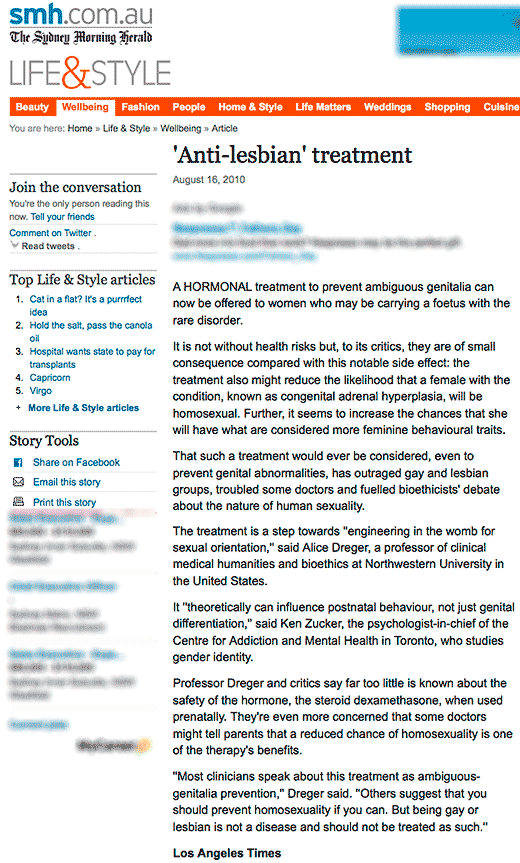Sydney Morning Herald: “‘Anti-lesbian’ treatment”
The original article that the two Australian-published versions of this story is from the LA Times newspaper and was written by LA Times journalist Shari Roan. The article was titled Medical treatment carries possible side effect of limiting homosexuality and it was published on Sunday 15th August 2010.
The original article quotes Alice Dreger, Ken Zucker and Heino Meyer-Bahlburg throughout on the misuse of dexamethasone (aka dec) on fetuses in utero that may or may not have Congenital Adrenal Hyperplasia (aka CAH), a biological variation that can underlie intersex. The Age and The Sydney Morning Herald’s versions leaves out any mention of intersex.
A hormonal treatment to prevent ambiguous genitalia can now be offered to women who may be carrying a foetus with the rare disorder.
It is not without health risks but, to its critics, they are of small consequence compared with this notable side effect: the treatment also might reduce the likelihood that a female with the condition, known as congenital adrenal hyperplasia, will be homosexual. Further, it seems to increase the chances that she will have what are considered more feminine behavioural traits.
That such a treatment would ever be considered, even to prevent genital abnormalities, has outraged gay and lesbian groups, troubled some doctors and fuelled bioethicists’ debate about the nature of human sexuality.

The treatment is a step towards “engineering in the womb for sexual orientation,” said Alice Dreger, a professor of clinical medical humanities and bioethics at Northwestern University in the United States.
It “theoretically can influence postnatal behaviour, not just genital differentiation,” said Ken Zucker, the psychologist-in-chief of the Centre for Addiction and Mental Health in Toronto, who studies gender identity.
Professor Dreger and critics say far too little is known about the safety of the hormone, the steroid dexamethasone, when used prenatally. They’re even more concerned that some doctors might tell parents that a reduced chance of homosexuality is one of the therapy’s benefits.
“Most clinicians speak about this treatment as ambiguous-genitalia prevention,” Dreger said. “Others suggest that you should prevent homosexuality if you can. But being gay or lesbian is not a disease and should not be treated as such.”
External links
- AlterNet – The CIA’s Shocking Experiments on Children Exposed — Drugging, Electroshocks and Brainwashing
- Los Angeles Times – Medical treatment carries possible side effect of limiting homosexuality
- smh.com.au – ‘Anti-lesbian’ treatment – also published on page 4 of The Sydney Morning Herald on Monday, 16th August 2010.
- The Raw Story – Rights groups, doctors condemn ‘anti-gay’ hormone treatment
- theage.com.au – ‘Anti-lesbian’ treatment
One Comment
Comments are closed.
“It is not without health risks but, to its critics, they are of small consequence compared with this notable side effect”
One of these “health risks of small consequence” happens to be the possibility of neurotoxicity, also known as “death”. Dexamethazone is a medicine created to prevent some of the non-harmful effects of CAH (CAH can be pretty nasty, but having ambiguous genitals won’t hurt you) and has been moved to human testing despite serious problems in animal testing (see “neurotoxicity” above), and yet most everything I read about it concentrates on the “some people want to prevent lesbians” thing.
Yes, a handful of quack doctors are trying to push it as a prevention for female homosexuality and non-stereotypically-feminine behavior in XX persons. However, the possibility that it may affect sexuality in the heterosexual direction is hardly the most problematic part of this treatment. This isn’t a sex issue, beyond the fact that LGBTQ groups should be working to protect intersex rights, and I find the fact that people are concentrating on the “anti-lesbian” aspect more than they are questioning the necessity for this drug to exist in the first place. Certainly the views of this medical minority are homophobic and deserve to be challenged, but pushing that as the most important part of challenging the drug itself OVER concerns of intersex people and diminishing those concerns as “of small consequence” is idiotic.